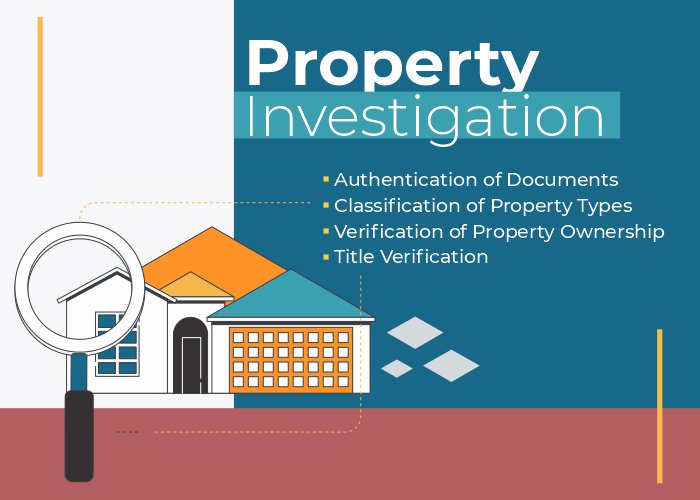Deceit and incidents of criminal nature involve issues to do with ownership and the real state of affairs on properties. Crucial for identification of concealed facts, existing property rights’ nature, cases of fraudulent transactions, and in the course of a legal battle, is property investigation as part of the forensic investigation.
Forensic property investigation refers to the process of affirming the genuineness of property documents or documents used in property transactions or investigating the roots of ownership or undertaking research and investigations of suspicious property related transactions in a bid to establish the truth.
In this blog post, we will explore the concept of property investigation in forensic, why it is important, the methods applied, and the process by which forensic investigators ensure the revelation of the untold story about property ownership.
What Does Property Investigation Mean?
In forensic, property investigation means looking at all records of property such as conveyances, account books and other documents to establish the actual owner of an asset. It may include fraudulent acts investigation, registration history, or proof of reliability of property-related papers.
Forensic property investigators are superb operatives that execute traditional and technological procedures in an investigation of property records and scandals, investigation of land deeds, analysis of financial records, etc. Their function is to explain situations and offer advisories on how to solve conflicts wherever there is crime, property theft, fraud, or any unlawful business transactions.
Need for Property Investigation
Property investigation is essential for several reasons:
Fraud Detection: Among the many uses of property investigation, the most frequent is to establish if a property deal is fraudulent. According to the fraudsters, forgery of documents, submitting wrong information or other ways that allow them to gain unlawful possession of the property, or sell it. After the occurrence of such frauds, forensic investigators study the records in order to get to the bottom of it all.
Legal Disputes: Land use litigation is a common phenomenon that comes from one of the causes including dispute over ownership of property. Forensic property investigation services can be of great help in legal matters by providing proof to help in the determination of rightful ownership by authenticating documents and the property history.
Criminal Investigations: Surveillance of properties is critical in conducting investigations when crimes like money laundering, tax fraud or grabbing of other people’s land. It can even be used to track the origin of an asset and point out several fraudulent activities occurring in a certain transaction.
Estate and Inheritance Issues: House returns that heirs or other family members are likely to challenge the ownership of the property in case of inheritance. The forensic property investigators can study the wills, trust documents and property owners’ records to get the rightful owner.
Equipment and Methods Employed in the Investigation of Properties
There are different methods used by forensic property investigators to get to the real ownership. Some of the key methods include:
Documentation Check and Review
Among all the methods employed for forensic investigations, property verification is the most common method. Title deeds, sale agreements; titles are subjected to scrutiny to ensure they are genuine. The available factors include signatures, stamps, notary marks together with other security features that give a cue to experts in the confirmation of the particular document.
Document tampering is rife in property fraud and a forensic document examiner can easily note the changes made. It is therefore possible for the investigators to tell if the document was tampered with or was actually created fraudulently.
Land and Property Record Search
Another activity associated with forensic property investigators is the research into the documents of title deeds or registration documents to establish ownership of the land being investigated. These records contain information about previous owners, sale, transfer and mortgage of the property usually in a descending order. From the title search, possible breaks in ownership or other legal transfer of property can be noticed or other unusual chain of transfer.
Government records especially that of land are a central source of information to many. Police match these records with other documents in a bid to discover the whole history of the particular property.
Financial Transaction Monitoring
In most of the cases ownership of property can be determined through the financial records like mortgage payment, loan, sales, etc. When dealing with the cash flow related to a property, forensic investigators, along with other financial consultants, scrutinise bank statements, payment records, and other financial papers. This enables them to assess whether the acquisition was genuine or if it involved some form of fraud like money laundering or other form of concealing assets.
Digital Forensics and Data Analysis
Digital forensics has become an important factor in property investigations mainly because more property transactions are done online. They employ technological methods to analyze documents, messages, contracts, consumption records and other data bases which are available electronically to check with the truth and search for the positive facts.
Digital forensics transforms information hiding in computers into evidence showing fraud like fake property listing or e-mail correspondence as part of a sting. Anti-fraud experts use such factors as metadata, IPs, among other faint footprints that outline the sources of fraud.
The Nature of Work Done by Forensic Property Investigators
Professional forensic property investigators pay a logical process to investigate genuine ownership of property. Here’s how the process typically unfolds:
Assessment of Referral Information and Case Evaluation
Whenever conducting property investigation the first process is to sit and talk with the client to get the picture. This could be a legal point, issue of fraud or something as simple as a request for the legal history of a particular piece of land. The investigator collects all possible papers, such as deeds, contracts, and financial statements, during investigation to make the first conclusion.
Review of Documents and Records
After the details of the case are ascertained, the professional forensic property investigator starts to scrutinize all property related paperwork. It refers to verifying or confirming such factors such as forgery or alterations of signature or date etc. Police often use records of the land to collect historical documents of the property and the previous transactions that took place.
Collection of Data and Comparison and Analysis
The investigator compares the documents with source documents, government databases or any other records, financial records or digital media. This is important in discovering hidden relationships or in exposing scam. For example, possession transfer of some property might seem legal and above board but may appear suspicious when checked against income tax returns, trade or other business against a list of property owners in some blacklists.
Reporting Findings
In the view of the above, forensic property investigations entail considerable analysis to prepare a comprehensive report. This report traces the ownership of the said property, determines any irregularities and finally provides a conclusion on whether the title to the property or the sale thereof is legal or not. More often it is used in court as a tool for backing up legal actions and operations in the courtroom.
Conclusion
Property investigation services in forensics are an essential weapon in the discovery of ownership truths and litigation. From document analysis, record research, financial tracking, and digital forgeries, an investigator is well placed in detecting, tracing ownership history and in any legal matters that may involve properties. Whether it is verifying ownership of the recorded deed or exposing a concealed crime, forensic property investigation provides justice and clears up much of the confusion that is surrounded property ownership.



